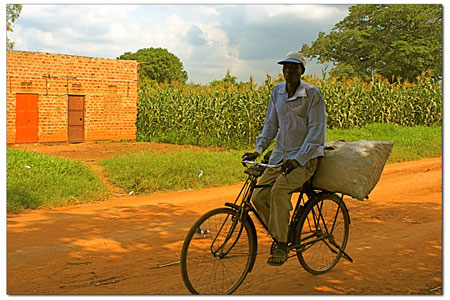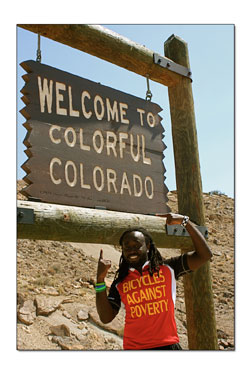 |
| A Ugandan man rides through a village on a bike he bought through Bicycles Against Poverty, or BAP. The nonprofit organization, which helps Africans buy bikes for work, medical needs and everyday life, recently came through Durango on a cross country fund-raising tour. The group gives small loans for the bikes under “microfinance,” considered one of the best tools to combat global poverty./Courtesy photo |
Vehicle for change
Group uses bicycles to combat poverty in Africa
by Maggie Casey
As Colorado watches 124 of the world’s most elite athletes battle it out on their home soil in the USA Pro Cycle Challenge, another group of riders is silently making its way across the Rocky Mountains. But they aren’t stopping there. Bicycles Against Poverty is hosting its inaugural coast-to-coast bike-a-thon in which seven riders are trying to raise $100,000. In Uganda, the focal country of this organization, $100,000 will buy 1,000 bicycles.
As Colorado watches 124 of the world’s most elite athletes battle it out on their home soil in the USA Pro Cycle Challenge, another group of riders is silently making its way across the Rocky Mountains. But they aren’t stopping there. Bicycles Against Poverty is hosting its inaugural coast-to-coast bike-a-thon in which seven riders are trying to raise $100,000. In Uganda, the focal country of this organization, $100,000 will buy 1,000 bicycles.
Last week, the group, which goes by the acronym BAP, was in Durango spreading its message en route from California to the East Coast. While many Durango natives might look forward to a five-hour Saturday bike ride or hike, in the largely rural country of Uganda, the closest hospitals, markets, cities and amenities can be a grueling five-hour walk. “I remember being struck by the sheer remoteness of many of the villages. And how long people would walk just to buy soap, sell their farm goods, or get to see a doctor,” says BAP co-founder and director Molly Burke, during a break in Durango. “They didn’t think twice about walking five to seven hours one day just to get to the nearest market.”
Burke’s involvement with Bicycles Against Poverty began in 2008 at Bucknell University in Pennsylvania, when she met founder and Ugandan native Muyambi Muyambi and began to work with him to begin a student organization. After receiving a grant from Clinton Global Initiative University, the Bucknell organization evolved into a nonprofit.
 |
| BAP co-founder Muyambi Muyambi poses under the infamous Colorado sign outside Cortez last week. The three riders left California on Aug. 6 and hope to reach their final destination, Boston, in a few weeks./Courtesy photo |
“In Uganda and throughout East Africa, bikes are in high demand, but not many people can afford the $100 bikes in one payment, which is why our program is in need there,” says Burke. “We find that most participants loan out the bike to neighbors or relatives who use it go to the hospital. Bikes are often lent out for people who need to take their child to the hospital because of malaria.”
According to the United Nations, Uganda has one of the highest malarial mortality rates. Also, like many other African nations, many citizens are infected with HIV.
Burke tells the story of one bike recipient, Rose Acen, who is now able to bike to the hospital to collect her HIV medicine. “Her husband also has HIV and the two of them must go to the hospital every one to two months for check-ups and to collect the medicine,” she says. “Before receiving the bicycle, Rose would walk the 4.5 miles to get the medicine and, when she was feeling too weak, she would have to pay for a taxi ride.”
Yet, not every recipient is a worst-case scenario. Bicycles Against Poverty functions on a repayment system, something that separates it from many other charitable organizations, Typically, it’s between $2 to $7 a month for up to a year and a half. For one recipient, traveling by taxi to get his HIV medicine cost him $4.50 per visit every few weeks; the monthly payment on his new bicycle is slightly less.
A bicycle in Uganda is a powerful tool, says Burke. And while some communities will subsidize a bike up to 50 percent, purchasing a bike empowers the individuals, “making them realize that they can work for something and earn it themselves.”
This is a principle of microfinance, the practice of giving aid to impoverished and rural individuals or communities that do not have access to loans or technology. According to a recent report in the New York Times, microfinance has become one of the most powerful antipoverty strategies in the world.
Burke gives a real-life example of this principle at work on the blog she writes for Bicycles Against Poverty (http://www.rotu.org/blog). After receiving a BAP bicycle, “Jimmy” was able to expand his small business of selling firewood. With the extra money, he invested in a goat and now has four. He also was able to purchase materials to make a chicken coop and install a solar panel to give him light at night and charge his cell phone. Jimmy even introduced Burke to his goats; he called them “BAP goats” because he wouldn’t have been able to purchase the livestock without the bicycle.
There are three riders partaking in the entire route, with four others participating in parts of the journey. The three main riders began in Santa Monica on Aug. 6, with stops planned in Denver, St. Louis, Chicago, Cleveland, Pittsburgh, Philadelphia, Washington, D.C., New York City and Boston. For Burke and many of the crew and riders, the people they meet along their journey make it memorable. Durango, which she refers to as “cycling heaven,” has so far been the highlight of the trip, with bike-talk in coffee shops and the town buzzing in anticipation of the Pro Cycling Challenge.
“The energy is contagious,” she wrote in the BAP blog, “and has certainly pumped us up, especially as we head further into the Colorado hills.”
Those “hills” were the San Juan Mountains over Wolf Creek Pass to Monte Vista, which the riders tackled the following day. After arriving in Colorado via the more gentle terrain of Cortez, Wolf Creek Pass was a challenge to say the least. “Our ride from Durango to Monte Vista was full of great scenery but as anyone that has been to Colorado would tell you, the scenery comes with hills like no other,” wrote Muyambi in that day’s blog. “As I continued to ride and look down, I could see the fruits of my persistence. The view was amazing. Whenever I felt like giving up, I remembered I am doing something that less than 1 percent of the people in this world will ever do.”
Meanwhile, Muyambi is dedicating himself to helping a community half a world away by doing something many Durango residents do every day: riding his bike.
And in a town where many people own bikes, sometimes several, costing upwards of a few thousand dollars, Burke offers a simple reminder of the power of two wheels. “In Uganda, a bike costs $100 and the power of it is felt throughout an entire household.”
To follow Bicycles Against Poverty or make a tax deductible donation, please visit http://www.BAPcoast2coast.com or http://www.bicyclesagainstpoverty.org.
In this week's issue...
- December 18, 2025
- Let it snow
Although ski areas across the West have taken a hit, there’s still hope
- December 18, 2025
- Look, but don't take
Lessons in pottery theft – and remorse – from SW Colorado
- December 11, 2025
- Big plans
Whole Foods, 270 apartments could be coming to Durango Mall parcel
